Weezer, "Back To The Shack"
There is an alleviating simplicity to this song, which goes mostly where you expect it to until Rivers Cuomo starts talking about “rocking out like it’s ‘94” and then suddenly things become quite dark.
How to Work for the Enemy and Feel Just Fine
by Matthew J.X. Malady
People drop things on the Internet and run all the time. So we have to ask. In this edition, writer and co-founder of The Toast Mallory Ortberg tells us more about what it’s like to work at a famous conservative think tank.
I used to intern at the Hoover Institution AMA
— Mallory Ortberg (@mallelis) July 7, 2014
Mallory! So what happened here?
Oh! I forget how this came up, exactly, but yes, for one summer I was one of several interns at the Hoover Institution, which is a fairly conservative public policy think tank attached to Stanford University, and woe betide you if you refer to it as the Hoover Institute, as I did on my first day.
This was in the summer of 2010, I think; I had graduated the year previous from a Christian college in suburban Los Angeles with an English Literature degree and was profoundly unemployable. After about eight months of flailing in LA, where the only work I could find was picking up a few holiday stocking shifts at the BevMo, I moved north to live with my family and try to find a job.
And I did find jobs! I found several jobs, and I was so horrified at the prospect of ever being unemployed again that I took all of them. So I worked four mornings a week at the Hoover, reviewed The Vampire Diaries for a pop-culture site based in Washington, D.C., waited tables every afternoon until midnight, and twice a week drove up to Marin to copyedit at an ecologically minded women’s website. Which I guess sort of balanced out the Hoover work, politically.
The Hoover probably paid the best out of all of them. I think I earned between $12 and $15 an hour, which was more than I’d made at the BevMo, even. I’d ride my bike over to the campus every morning and run in through the Hoover Tower, which is quite lovely. My friends were all working at shoe stores and call centers and veterinary offices at the time, so they were mostly just excited I’d found a job. We’d all graduated at a really difficult time, you know, so there was a sense of victory whenever any of us found work or was able to afford an apartment on their own.
I just wanted a job. I wanted a reason to leave the house in the morning, and I wanted to learn how to be in an office, and I wanted to not email my resume to a thousand different Craigslist posters and bother my professors for letters of recommendation. I had no qualms about taking the job. I was grateful for it. I would have taken almost any job at that time.
Maybe I wouldn’t have taken a job actively fracking an orphanage, but I would have happily supervised the fracking from a building a few miles away, where I didn’t have to look at the orphans.
Mostly I delivered the morning edition of the Financial Times to various offices and worked a bit in the mailroom (where I ran into my high school prom date once), and updated mailing lists and answered calls from Haaretz at odd hours. But sometimes I’d get a last-minute email asking me to copyedit an op-ed that was about to run in the Wall Street Journal, and I was kind of amazed by the editorial latitude I was given.
“I can just . . . change whatever I want? Even though it’s going to run under _____’s name in the Wall Street Journal?”
“Just make it better.”
So I did! And, you know, this was right around when the Hoover published Ending Government Bailouts As We Know Them, so I did some very low-level publicity coordinating. There were at least two other interns at the time — both of whom were real Stanford students and very nicely dressed — who did a lot more of the substantive work. Everyone was very friendly and bookish and low-key, and I had a massive chip on my shoulder. I felt like an idiot sitting next to a bunch of Stanford and Ivy League grads when I’d gone to a really unimpressive school, and I felt like everyone around me had attended a seminar on success that I’d slept through and I’d never be able to catch up.
That was probably the toughest part for me, more than whatever political differences existed between me and most of the other employees — feeling like I was surrounded by success, by education, by money and authority and everything I wanted for my own life, but I couldn’t touch it.
Having gone through it, and knowing what you know now, would you do it again?
I would absolutely go through it again. I was never asked to do anything that, you know, compromised my high ideals, which were mostly a jumble of incoherent nonsense anyhow. It helped me save up enough money to get my own place and start a savings account, and because of that experience there I was able to get my first job in academic publishing.
I ran into Condoleeza Rice on the stairs once! Well, we didn’t run into each other so much as use the stairs at the same time. But I suppose that qualifies as significant.
These were really your establishment conservatives, you know, who prided themselves on being well-read and respectable and polite, so there wasn’t a lot of Tea Party rhetoric or anti-intellectualism or anything like that. There was, generally, a sense that President Obama was a big-government monster, and a lot of talk about Keynes that frankly I didn’t understand. But there was none of the dog-whistle racism that I rather expected to encounter. Very little talk about the, you know, culture wars. Mostly economics.
I think part of me was dimly HOPING to be tested, because it would have been sort of fun to think of myself as this stealth liberal, but that never happened. I mean, my boss was a former member of the Bush administration; obviously we had different politics, but there wasn’t really a sense of “we few, we merry few, we Bay Area Republicans” around the office. It was a lot like working with Jeopardy! contestants — friendly, mostly quiet nerds. (I also lost on Jeopardy! that same year. It was a year rich in life lessons).
I’m sure if I’d been more well-read or aware of the news at the time I’d have felt more conflicted, but I was plenty used to being around conservatives after going to school where I did. To be honest, I quite like knowing people who think about things quite differently from me — you know, living and working the way I do now, it’s not at all difficult to move in very politically uniform circles.
Also, the archives in the Hoover Tower were absolutely tremendous. That was very cool, getting to see some of the materials that were being housed there.
Lesson learned (if any)?
If you need a job and someone offers you a job, take the job. Working is better than not-working. Then, four years later, start your own media empire with someone you met on the Internet.
Just one more thing.
I probably regret more how often I wore my BevMo uniform even after I lost that job because I thought I looked compelling and butch in a green polo shirt and men’s cargo khaki shorts than I regret working at a hyper-conservative think tank. It took me years to get rid of those shorts.
Matthew J.X. Malady is a writer and editor in New York.
The Borowitz Problem
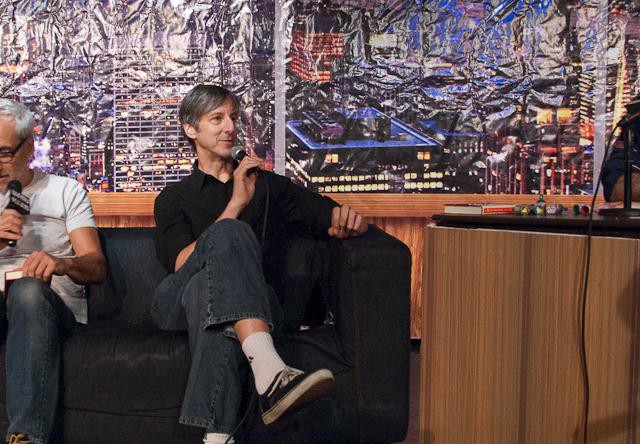
There’s a new New Yorker website on the internet today, but one problem still hasn’t been fixed:
A good deal of that traffic can be credited to Andy Borowitz — the satirist and “Shouts & Murmurs” contributor whom The New Yorker hired in 2012 to anchor its newly introduced humor blog, and whose Boomer-liberal brand of humor regularly produces groans from younger, more web-native corners. According to Thompson, “The Borowitz Report” was responsible for six percent of all of NewYorker.com’s traffic last year.
My goodness is it difficult for people to talk about the Borowitz situation! Which maybe explains how it has been allowed to persist for so long. The Borowitz Problem isn’t that he isn’t funny, or that he panders as a rule, or that “Boomer-liberal” humor (which is I guess is meant here as a euphemism for “unchallenging and smug?”) is out of date. It’s this:
@NewYorker @BorowitzReport Looks like something out of an @TheOnion article.
hahaha Ukraine can be "Cranium" and Crimea can be "IKEA"? Seriously Travolta, what's wrong with you? http://t.co/WmcOgicizI via @NewYorker
— @ivykhaw
“The news, reshuffled” is both the Borowitz Report’s tagline and a literal description of its product (here is a bot that does the job better). In the narrow context of his section of the website, he can write in his trademark style — slightly zany aggregations of the news, in which conservatives say what they REALLY mean, or whatever — and get away with it. Or in the context of an email newsletter! But when you publish a fake headline that sounds almost real, place it on top of satire that’s soft enough to skim without really reading, give it a newyorker.com URL, and promote it on Facebook, where basically every headline sounds like satire now, you know what you’re really doing.
Not always, but frequently, these posts are going to go viral as the result of people who don’t know they’re jokes; as a bonus, every few months, a foreign outlet will aggregate them as if they’re genuine. That Travolta story had, at one point, over ten thousand Facebook shares, not because a sophisticated joke flew over thousands of heads, but because its form is intentionally misleading. (On months with huge Borowitz hits, I’m guessing that quoted six percent figure climbs quite a bit higher.)
This has been going on for two years and it’s only gotten worse. You hear these “groans” from “younger, more web-native corners” of the internet because cultivating stupid-sharing is the second lowest way to juice traffic, below shredding your reputation to publish generic sharebait and just above buying traffic outright. There’s a fat and clearly visible line between satire and just tricking people.
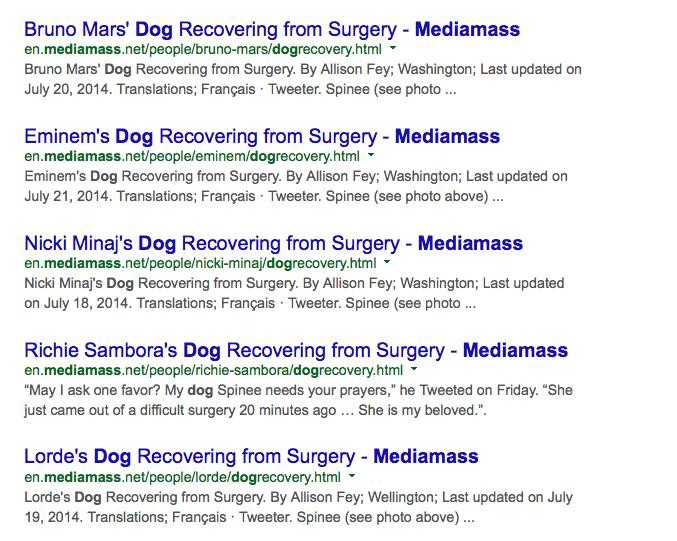
Leave this game to the people with nothing to lose!
Seriously, Fuck You, "Kindle Unlimited"
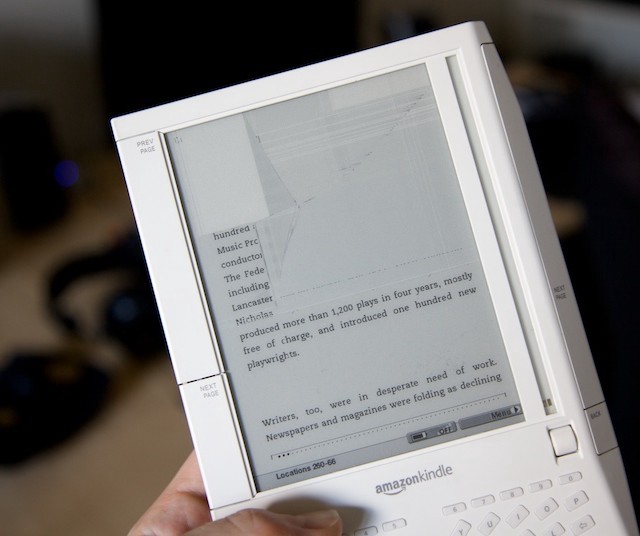
Last week, Amazon informed us that for ten dollars per month, Kindle users can have unlimited access to over six hundred thousand books in its library. But it shouldn’t cost a thing to borrow a book, Amazon, you foul, horrible, profiteering enemies of civilization.
For a monthly cost of zero dollars, it is possible to read six million e-texts at the Open Library, right now. On a Kindle, or any other tablet or screen thing. You can borrow up to five titles for two weeks at no cost, and read them in-browser or in any of several other formats (not all titles are supported in all formats, but most offer at least a couple): PDF, .mobi, Kindle or ePub (you’ll need to download the Bluefire Reader — for free — in order to read ePub format on Kindle.) I currently have on loan Alan Moore’s Watchmen, Original Sin by P.D. James, and The Dead Zone by Stephen King.
Perhaps you would prefer to download books onto your Kindle, and keep them there permanently. In that case, please hie yourself over to Project Gutenberg, which has been offering free public domain e-texts since 1971. There, you may download any of over forty-five thousand books onto your Kindle. Or one of thousands of Librivox audiobook recordings made by volunteers, all in the public domain. (R.I.P. Michael Hart, founder of Project Gutenberg and one of the Internet’s greatest benefactors.)
You can do anything you like with the public domain books and recordings you download from Project Gutenberg or the Internet Archive: Make a literary Girl Talk-type mashup with them, hide Satanic messages in there via “backmasking,” make letterpress reprints of the books and illuminate them by hand with gold leaf like a medieval monk and sell the results on Etsy. It’s all free and legal. That is what “public domain” means. (By the bye, I wrote to the PR contact supplied by Amazon in the subject press release, and asked how many of these six hundred thousand titles offered through Kindle Unlimited are in the public domain and therefore, already free to the public, but did not receive an answer.)
Are you interested in borrowing the most recent titles? Perhaps you belong to a public library. I live in Los Angeles, and am a grateful and loyal patron of the Los Angeles Public Library, and of all the lucky things in this world, I live about ten minutes’ drive away from our gloriously beautiful and fantastic main library downtown. But maybe I don’t feel like driving ten minutes — in which case I can use my Kindle to check out e-books from the library, zillions of them. There are all different e-book programs, such as OverDrive, and countless recent popular books to check out, including Insurgent, which is the sequel to that daft Divergent book. (I saw the movie on the plane, I don’t know! I can’t help myself.)
Maria Bustillos is a writer and critic in Los Angeles. She also started an auction site for rare books, once upon a dot com.
Question Hrmm
An example of the insightful questions that some venture capitalists must ask before they decide to shower an app with money, so much money:
Robyn Exton, the founder and chief executive of Dattch, a location-based dating app aimed at lesbians, once pitched her product to a venture capitalist who asked a colleague, “>Do you think if I invest, people will think I’m gay?”
Obviously, the answer is super.
28 Years with Weird Al
by Bex Schwartz

My Bubby and Zaydee came to visit from Florida and I couldn’t wait to share my all-time favorite musician with them: Weird Al. I sang every single song from his first two albums. I showed them the video for “Eat It,” which we had taped off of MTV. “Why do his eyes turn yellow at the end of the video?” I asked, having never seen the Michael Jackson video for “Beat It.” They were slightly confused. “Because sometimes people eat bad food and then their livers don’t work and so their eyes turn yellow,” Bubby said. “Don’t you love it?” I asked. I decided she must because she understood things like why people’s eyes might turn yellow if they eat the wrong food.
My cousin Ben had introduced me to the music of Weird Al in 1986, when I was seven years old. I didn’t get the original references from his parodies, but I knew the music was brilliant and dove into his oeuvre until I figured out what every Polka Medley was referencing. Everyone else loved the New Kids on the Block, but I loved Weird Al. We rented “The Compleat Al” and our local video store, Home Video Plus, had to put in a special order just to get it to Glen Rock.
On the Rosh Hashanah before I turned my eight, my dad made a grand announcement at dinner. My dad does this thing where he settles in and shakes his shoulders back and forth when he has important news. “There’s a concert,” he said. “Weird Al is opening for the Monkees at Great Adventure. We’re going.” While Weird Al was my longterm favorite, I was recently obsessed with the Monkees. Due to pop cultural reasons beyond my childhood ken, the Monkees were experiencing a major renaissance around that time, and they were the only tapes we listened to on family car rides. I even had my first sexual fantasies about the Monkees — first Micky Dolenz and then Mike Nesmith.
It was our first family amusement park outing. We got to the arena early — it was right behind the Teepee that sold goods partially pertaining to the Indigenous Peoples that no longer exists because it’s totally offensive. We looked around. “Everyone else is here for the Monkees,” dad said. “But we’re a Weird Al family.”
Weird Al opened the show and danced with giant Mister Potato Heads while singing “Addicted to Spuds.” There were costume changes and props and accordions and medleys and songs we’d never heard before like, “It’s Still Billy Joel To Me.” We cheered for his drummer, Jon “Bermuda” Schwartz, since he was a Schwartz like us. Then the Monkees took the stage (minus Michael Nesmith, who was still being a Liquid Paper heir and refusing to join the band). They played all of their old hits and two of their newest songs: “Heart and Soul” and “That Was Then, This Is Now.” Davy Jones changed into a dress for a few numbers and pretended to be a woman, but Peter Tork wore a red shirt and white pants and was the coolest man I’d ever seen.
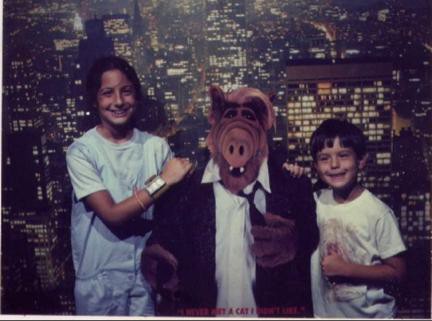
After the show, we rode the non-scary rides and took a photo with our arms around a cardboard cut-out of Alf; please note that I am wearing a hand-me-down lilac jumper and my mom’s giant digital watch. As we headed towards the exit, my dad said “hey” to someone. (My dad is not Mister Social; my mother was the schmoozer. Once she said hi to someone on the street and my dad asked who it was. “Oh, just someone I went to camp with,” she said. It was Woody Allen.) “Who was that?” we demanded. “Weird Al,” dad answered. We set off on a chase, until my mom cornered the man in a Hawaiian shirt, nerd glasses, curly hair. “Are you?” she asked. “Am I who?” the man said. It was HIM. We told him how much we loved him and how we knew every single one of his songs and how we watched “The Compleat Al” at least once a week. My mom shoved me gently. “Sing him your songs,” she said.
I had started writing parodies as soon as I learned about the concept. I was regularly tormented by girls in third grade who told me I looked like a boy and was the ugliest girl in the class, so I made parodies of the songs they loved the most — everything by Tiffany and Debbie Gibson and the New Kids on the Block. Sometimes my mom would help; I’d come home and cry and then she’d ask what songs the popular girls liked and we’d sit down and write parodies.
I stared at the ground because I was afraid of locking eyes with Weird Al and sang my parody of “Stand By Me,” called “Stand By Please,” which was about calling customer service. Weird Al said my songs were good and shook my hand and I vowed I would never wash it again, but I think my mom made me take a bath the next day. I tried to keep that hand out of the water but it was really tough.
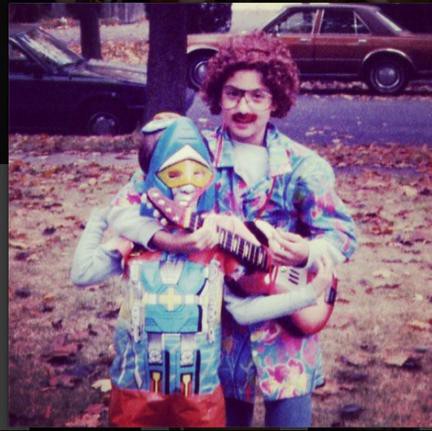
The following Halloween; I have a toy guitar because we did not own a toy accordion.
Smashcut to next summer, when I spent four weeks at Jew camp where I was desperately homesick. I cried every day. I didn’t speak Hebrew as well as the kids who went to Jewish day schools; I didn’t know the prayers; I hated going to kitah; and the lake was cold and scary and deep. Then I got strep throat and was stuck in the Marp, which is what we called the camp infirmary. There were nice nurses and mean nurses and a woman who we called the Marp Monster, a giantess who drove a van around camp sitting in the passenger seat because she couldn’t fit behind the steering wheel. The girls from Long Island were all richer than us and they wore fancy clothes like Hot Doggers and Cavariccis and I didn’t know that it wasn’t cool to pull your socks all the way up your shins and so I did that every single day because my socks felt better that way.
The Marp released me on the night of the talent show, and for some insane reason I decided I was going to get on stage and perform a medley of all my parodies to prove that I was more than just the girl with the weird sock thing who cried all the time. I sang — a capella, of course — all of my songs: “I Think We Will Moan Now,” which was a parody of Tiffany’s “I Think We’re Alone Now”; a parody of Belinda Carlisle’s “Heaven Is A Place on Earth” that started out, “Ooooh baby is there anything worse / than taking a ride in a big black hearse”; and several others, including a version of “Ticket to Ride” that was about barfing all over a slide. I was a hit; everyone applauded. After the talent show, everyone asked how I wrote all those songs and I proudly told them that when I grew up, I wanted to be the female Weird Al.
I got home from camp and told my mom that I felt really awesome when I was on stage. “You’ve got the bug,” she said. My great-grandfather was an actor in Russia and started a Bolshevik theater troupe when he moved to America, so apparently this performing thing was in my blood. My mom signed me up for acting and dancing lessons. I was all set; I belonged on stage, I just knew it.
Slow, deliberate dissolve to my life after college: I graduated with a double major in English and Theater, with a focus on directing. I also spent a stint in London doing performance art. I changed my name from Becky to Bex and became a weirdo downtown performer. I did stand up comedy, I performed in a weekly midnight show called “Grindhouse A Go Go” and started singing parodies again. I went through a phase where I used to do puppet shows with my breasts where I would perform a parody of Fischer-Spooner’s “Emerge.” I was protesting the hoopla over the Janet Jackson wardrobe malfunction. I’m sorry. All of this led to a job at VH1, where I wrote dozens and dozens of parodies for various promo campaigns. That was my greatest trick — I could write a Weird Al-style parody in minutes. After twelve years, I left VH1 to become the creative director of TeenNick. My office is next to Nick Cannon’s. (No, I’ve never met Mariah.) We shoot a lot of stuff in Nick’s office: our video countdown show TeenNick Top 10 and lots of liners for Nick Radio.
On Monday, I ran out around 3 p.m. to get a salad, because that is usually the only time I can grab some lunchfood. When I got back, Weird Al and two of his people were waiting in my elevator bank. He got into an elevator and I followed him. His people (manager, publicist, hairstylist? let’s just presume) pressed the button for forty, my floor. I was determined to keep my cool. I’ve worked with people like Paula Abdul and Hulk Hogan and Danny Bonaduce and Scott Baio; I don’t get starstruck and I never gush like a fangirl. Until I tapped Weird Al on the shoulder and told him that I was his biggest fan and his new video for “Tacky” was perfection and that I met him once when I was eight years old and that he had totally changed my life.
He asked when we met. “At Great Adventure! You opened for the Monkees! And then my dad said hi to you and my mom tracked you down and then I sang you all my parodies and I was a shy little girl wearing a lilac romper!” I squealed. “Ah, 1987,” he said. I kept talking and told him about how I still write parodies for my job to this day and that I think about his music all the time and how much it meant to me when I was a sad, shy, lonely little girl. I told him that I loved him so much I dressed up as him for Halloween in 1987. “Ah, the Old Al,” he said, when he still wore glasses and had short curly hair.
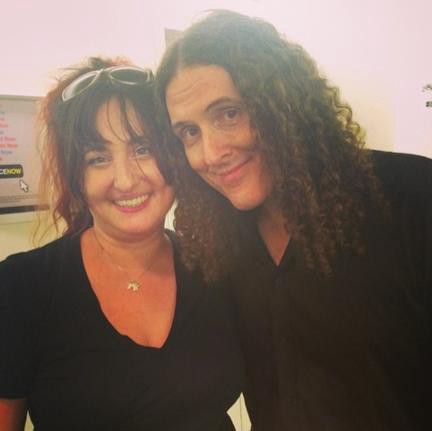
We got off on my floor. I was a little weepy by then. Maybe Al was, too. We hugged. His people took a photo of us to commemorate our re-meeting. Then they followed me so they could go record Nick Radio liners in Mr. Cannon’s office. While Weird Al was doing his shout outs and liners, I could hear him from my office. I printed out the photo of when I dressed up like him for Halloween and as soon as he was done, asked him to sign it. He wrote, “Stay weird. Love, Al.” We hugged again. And then I gave him a second printout to keep.
Bex Schwartz is a writer/director/producer/creative director who loves panda, cats and cats named Panda. She’s also Weird Al’s biggest fan.
New York City, July 17, 2014

★★★★★ Unbelievable breezes flowed though the clear, sparkling morning and in the open windows. The breeze blew down Lafayette in cool cloud shade, blew across Prince in the returning sunlight. Mothers wore jean shorts; men rolled trousers to show socks or ankles. Some gray gathered over Lower Manhattan, then — were there wet spots on the fire escape? If there were, they were gone soon enough, the whole interlude merely a reminder not to take this for granted. It would take more than that to ruin the day. It would take knives falling from the heavens. Now there was nothing in the sky but firm, well-spaced cumulus clouds. The downtown skyline shone. Uptown, the breeze yanked and shook shirttails, hemlines, pants cuffs. It flipped a necktie. Late sun passed right through banks of windows, bounced off other banks of windows. A concrete facade lit up like a lampshade. The breeze raised the river into dark blue ruffles, and the sun lit the stern of a boat cutting through those ruffles, leaving a smooth, brighter wake behind.
The Airbnb Hole
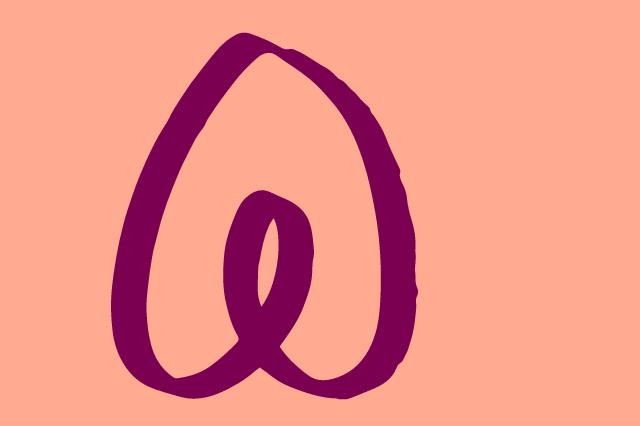
It is not the fault of Airbnb that its new logo looks like an anatomical negative space, a hole, its chief technology officer, Nathan Blecharczyk, would like to everyone to know:
We wouldn’t want to design a logo that caters to the lowest common denominator. This was a yearlong undertaking for dozens of people, it’s something meaningful, and no one pauses to really understand that.
But when one gazes into the hole — for how can one not — the tumble begins almost immediately, through the hole, beyond the hole. The world and every possible concern, hope, fear, or dream dissolves completely, leaving just you and the hole — you are the hole, and the hole is you — so that it becomes impossible to fully contemplate the long and varied chain of circumstances that led to its emergence, but for the dull ache of a single thought: It would be nice to rent out my apartment to make some extra money. But who has the space?
Brooklyn Residents Discover New Form of Entitlement
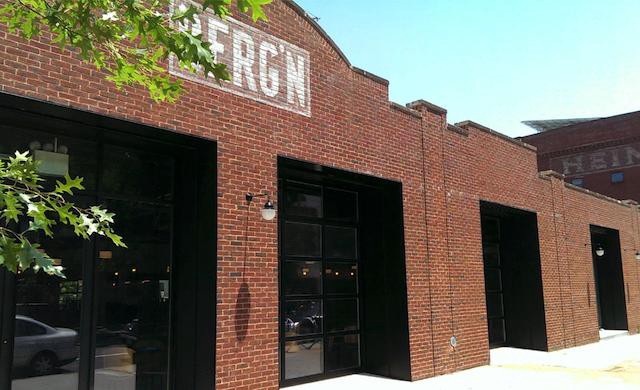
For a few months now, residents of Crown Heights, in Brooklyn, have been hearing about a new place called Berg’n. You couldn’t focus-group a better teaser for the target clientele: “A beer hall from the creators of the Brooklyn Flea and Smorgasburg featuring the food of Asia Dog, Mighty Quinn’s, Pizza Moto, and Ramen Burger.” It’s a big huge place with long tables with food truck food and a Recognizable Sensibility, situated on the middle of New York’s most aggressively gentrifying neighborhood, brought to you by Goldman Sachs. It’s going to be popular; the people for which it is intended look forward to the new leisure complex. They will use it to meet and discuss how much the neighborhood is changing.
But this place is opening late. A few months late or a few weeks, depending on when you started paying attention. Delays, whatever, something about the DOB: It’s just taking a little while to open the doors to this bar. But that is just fucking UNACCEPTABLE for Brooklyn’s Lifestyle Elite. They demand their beer hall NOW NOW NOW.
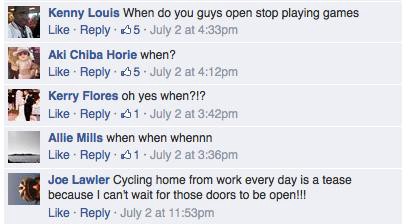
My apartment building materialized after capitalism lost control of a rogue algorithm six months ago, and also: Where is my beer hall?
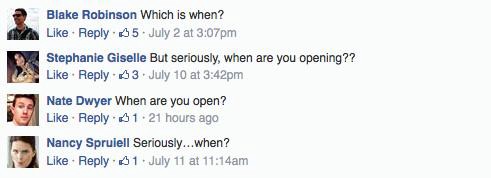
Here are the comments on three consecutive Instagram posts. We’ve figured out how to act like insufferable Yelpers in the absence of both Yelp and an actual open establishment:
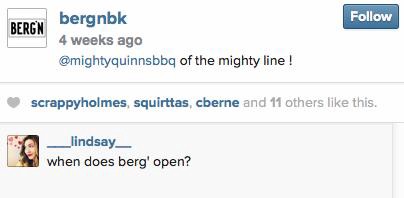
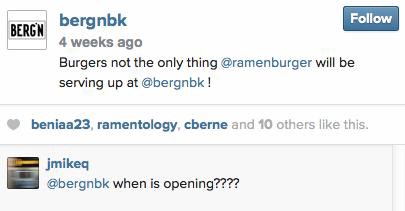
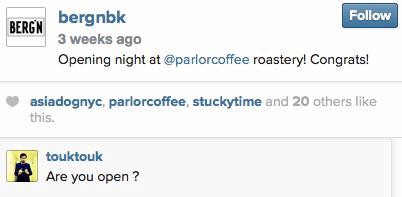
My beer hall is not open yet. I am trapped here in this barren plot in Breukelen, among the sullen settlers of the forsaken New Amsterdam, with nothing to do! I am not feeling served. Where is my beer hall.

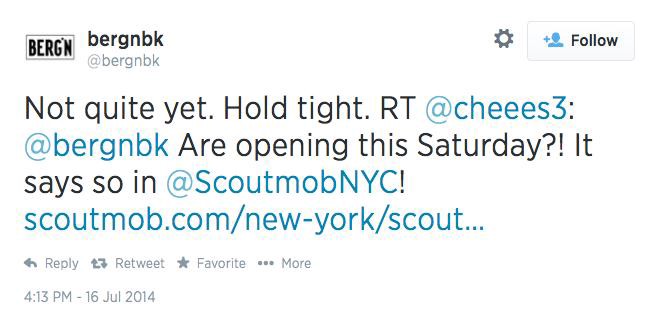
It is annoying when things that you expect to happen do not happen.
A Poem By Amit Majmudar
by Mark Bibbins, Editor
The Star-Spangled Turban
Hot pink frosting
on my chocolate-
cupcake noggin,
switched-on lightbulb-
yellow, tulip-
bulb topheavy
orange, sky-blue,
bruise-blue, navy
thought cloud, darkening:
Any towel,
any shawl will
serve as well to
bind this open
wound atop me,
mark me off as
not quite level-
headed, tops on
any watchlist.
It’s Old Glory
that I choose this
time: I pleat her,
sweep her, set her
on my head as
reverently as
any U.S.
M.C. honor
guard triangle
on a coffin.
Amit Majmudar is a poet, novelist, and essayist whose work appears widely. More information at www.amitmajmudar.com.
You will find more poems here. You may contact the editor at poems@theawl.com.
